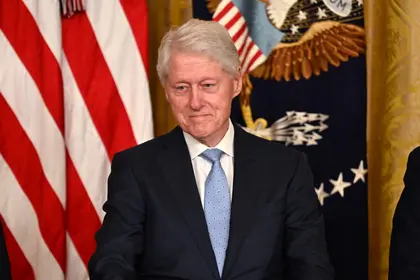In an interview with Irish news service RTÉ released on Tuesday, April 4, former U.S. President Bill Clinton expressed regret over the 1994 Budapest Memorandum.
“I feel a personal stake because I got them [Ukraine] to agree to give up their nuclear weapons. And none of them believe that Russia would have pulled this stunt if Ukraine still had their weapons,” Clinton said.
JOIN US ON TELEGRAM
Follow our coverage of the war on the @Kyivpost_official.
Remind me. What was the Budapest Memorandum?
When the Soviet Union collapsed in 1991, its nuclear arsenal was spread out among the various republics. After independence Ukraine became the world’s third largest nuclear power, after the U.S and Russia.
In order to forestall nuclear proliferation, the U.S., with Bill Clinton as president, made a concerted effort to convince the newly independent Ukraine to give up its nuclear weapons and transfer them to Russia.
On Dec. 5, 1994, the U.S., U.K., Russia, Belarus, Kazakhstan and, of course, Ukraine signed the Budapest Memorandum on Security Assurances.
Bill Clinton signed on behalf of the U.S., President Boris Yeltsin for Russia, Prime Minister John Major for the U.K. and President Leonid Kravchuk for Ukraine.
What were the assurances?
In exchange for Ukraine, Belarus and Kazakhstan abandoning their nuclear weapons and signing the Treaty on Non-Proliferation of Nuclear Weapons, the U.S., U.K. and Russia committed to: 1) respecting the independent states’ borders; 2) refraining from threats; 3) refraining from coercion; 4) providing assistance should one of the independent states be attacked; 5) refraining from nuking the nuke-less new state; and 6) seeking consultation in the event a “situation” arises.

Trump Makes 90 Day Foreign Aid Freeze – Ukraine Military Support Supposedly Untouched
Did it work?
Obviously not. On Feb. 20, 2014, amid Ukraine’s Revolution of Dignity, Russia initiated its invasion of Crimea and annexed it several weeks later.
At the same time Moscow fomented an initially covert effort to capture vast parts of the Donbas and southern Ukraine. By August 2014, when Kyiv was poised to retake Donbas territory lost over the spring and summer, Russia dropped any pretense of merely helping “local rebels” and invaded with thousands of their armed forces.
As Clinton put it: “I knew that President [Vladimir] Putin did not support the agreement President Yeltsin made never to interfere with Ukraine’s territorial boundaries – an agreement he made because he wanted Ukraine to give up their nuclear weapons.”
Indeed, as became clear from his 2021 essay in the lead-up to the full-scale attack, Putin had had his sights on Ukraine since independence.
“When it became convenient to him, President Putin broke it and first took Crimea. And I feel terrible about it because Ukraine is a very important country,” Clinton said.
Was Ukraine so naïve as to believe Russia?
The short answer is yes-and-no.
In March of last year the Wall Street Journal reported that immediately after Ukraine signed its final agreement to abandon nuclear weapons in 1994, then-President Leonid Kravchuk, said: “If tomorrow Russia goes into Crimea, no one will raise an eyebrow.”
One of the arguments for giving up the nuclear arsenal was money. Nuclear weapons are expensive to maintain, and Ukraine was broke. The West was ready to pay for expenses and Ukraine felt comfortable enough with the security assurances.
Another reason was the 1986 Chornobyl disaster. Independence came only five years after the worst nuclear accident in history. Ukrainians were still traumatized by its effects and many wanted nothing to do with nuclear technology of any sort.
So how did Russia get away with it?
Semantics goes a long way.
After the 2014 invasion of Crimea, the U.S. scrambled to explain away why they wouldn’t come to Ukraine’s military assistance.
Then-President Barack Obama hit Russia with some economic sanctions, but consistently refrained from offering lethal military assistance. His advisors claimed Russia had “escalation dominance.”
What Western pundits kept repeating was that the Budapest Memorandum was a “memorandum” rather than a “treaty,” a “pledge” or “commitment” rather than a “guarantee.”
Hence, Ukraine is insisting that the end game to this war will require some sort of iron-clad security guarantee. Obviously, NATO membership would be ideal.
Is Ukraine planning to produce nukes again any time soon?
No. But if it is, you can be sure nobody is saying anything about it.
“They were afraid to give them up because they thought that's the only thing that protected them from an expansionist Russia,” Clinton said.
You can also highlight the text and press Ctrl + Enter










